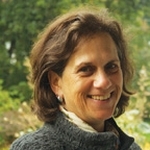 (Host) Commentator Deborah Luskin is a novelist, essayist and educator
(Host) Commentator Deborah Luskin is a novelist, essayist and educator
who likes visiting old cemeteries, despite once being cursed for doing
so.
(Luskin) Some years ago I volunteered to serve on a cemetery
committee. I figured that taking an inventory of old cemeteries would be
both straightforward and non-controversial. I was wrong on both counts.
As I learned at our first, organizational meeting, what was
driving the Select board to charge this committee was a woman with a jar
of a relative’s cremains that she wanted to bury in the old cemetery
where the people who had built her house were lain to rest – two hundred
years earlier.
In the time-honored way of committees, we worked
with careful deliberation, first ascertaining the names and number of
antique cemeteries in town and then determining their whereabouts. With
the help of a local authority on old cemeteries, we were able to locate
the lesser-known burial grounds and learn about the different burial
patterns that evolved to meet the changing needs of each generation.
In
the early years of Newfane’s settlement, nearly every hilltop hosted a
cemetery for those who lived nearby. Centralization into the town’s
three modern cemeteries didn’t occur until the twentieth century and the
advent of the motorized hearse. Furthermore, people used to be buried
in family plots, but this arrangement was ill-suited to mechanized
mowing, and even in Newfane’s oldest cemetery on top of Newfane Hill,
the stones have been reset in straight rows.
There were seven of
us on the committee. We made field trips together, sometimes
bushwhacking our way to cemeteries that were nearly reclaimed by the
forest; we drove on remote back roads; we read old gravestones; we
learned a lot of local history; and we had a really good time.
We
made our trips in the early spring and late fall, when the landscape
allows for the best viewing of the ground’s contours. And while we were
able to see that there was apparently considerable unused space in most
cemeteries, there were also many missing stones and many uncertain
graves. We also found that each cemetery told a story of a particular
family, settlement or time. Moreover, each cemetery exuded tranquility –
a kind of hush that we responded to by whispering while we made our
tour of inspection.
These old cemeteries gave us a glimpse into
the social history of our town, and when it came time to make our
recommendation to the select board, we were unanimous in suggesting that
no more burials take place in these antique cemeteries, so as to
preserve that social history intact.
Of course, this did not sit
well with the woman who started it all, and she cursed the committee,
hissing, "I hope you lose a loved one!"
Twelve years later,
three members of the committee have indeed passed on, and eventually,
the rest of us are sure to follow. Whether or not we believe in curses,
there’s no cheating death. Personally, I take comfort in believing that
how we live will determine how we are remembered.